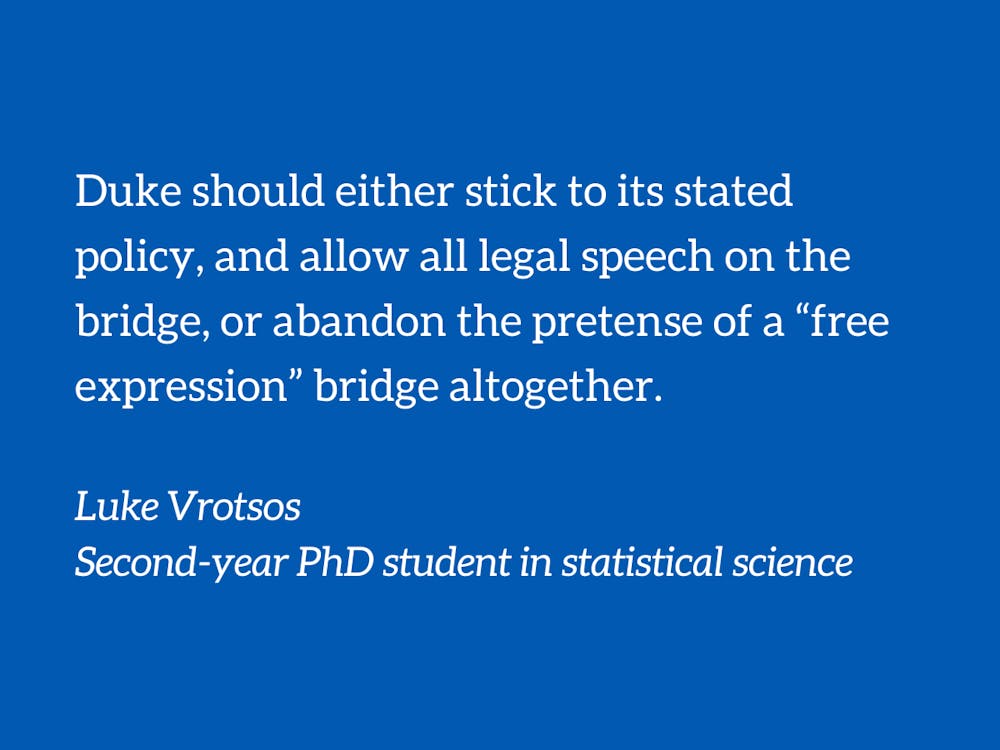Editor’s note: This article includes discussion of homophobic messages or slurs.
The official rules for Duke’s “free expression” bridge on East Campus have long stated that students “may express opinions within this area that are not restricted by content, except by legal standards." Students may paint over messages “no matter how recently they have been painted,” allowing anybody to remove any disfavored content. As written, this policy appears simple enough to implement: Given the broad speech protections in American law, little administrative intervention would be required. It also accords with Duke’s Statement on Open Expression, which promises not to “take the expedient and dangerous path of shutting down discourse.”
Duke administrators, however, appear to believe these commitments to free speech are more honored in the breach than the observance. Over the years, they have repeatedly removed content from the bridge and worked with police to identify the authors. In 2018, they added surveillance to the mix by installing a camera to help their investigations. Expression, far from being free, is monitored, censored, investigated, and publicly condemned.
“Free expression,” if it is to mean anything, must protect not only content that we agree with or mildly dislike but also that which we find vile and upsetting. As a gay student, I would prefer a campus without comments like “kill f[*]gs” (as one bridge troll wrote in 1994), “get AIDS in hell” (2010), or “fuck gays” (2016). Still, no coherent limiting principle exists that rules out these words but could not be used to justify banning speech that I support. Even apparently reasonable restrictions, like an old bridge policy that forbade “vulgar or obscene graffiti,” can result in such censorship. In 1997, Duke employees removed pride slogans painted by LGBT students, some of which administrators deemed “obscene.” More recently, Republican state officials have used similar language to justify banning books and drag shows. Invoking free expression to fight these misguided measures is effective only if one’s support is consistent.
The bridge controversy’s latest iteration has arisen amid the war in Gaza, with the university removing the second half of “Palestine will be free, from the river to the sea” last October. In April, administrators painted over the defacement of a Quranic verse and images connected to the destruction of the al-Aqsa mosque in Jerusalem. They also launched an investigation into the “circumstances surrounding this event.”
In their announcements of these actions, Duke administrators did not cite any “legal standards” that would restrict either message. They would be hard-pressed to find one: The First Amendment’s protection of free speech has no exceptions for hate speech or blasphemy. As Jenna Leventoff, senior policy counsel at the ACLU, said last year, “the First Amendment exists to protect exactly this kind of political expression. Therefore, phrases like 'from the river to the sea,' ... are protected.”
The April email did refer to the Duke Community Standard and the Policy on Prohibited Discrimination, Harassment, and Related Misconduct. The former states twice that there are no restrictions, apart from the law, on content at the bridge. While the latter contains some vague language, it helpfully gives 18 specific examples of prohibited conduct, including four of Islamophobia. Every example concerns behavior targeted at specific individuals, which the bridge messages were not.
Duke should either stick to its stated policy, and allow all legal speech on the bridge, or abandon the pretense of a “free expression” bridge altogether. In this scenario, the University would treat any graffiti on the bridge as the vandalism it would be in any other location. While I do not favor this policy, it would at least be honest and let the university maintain neutrality in contentious political matters. After all, Duke is under no obligation to host a “free expression” bridge — and, in practice, it already does not.
Luke Vrotsos is a second-year PhD student in statistical science at Duke.
Get The Chronicle straight to your inbox
Signup for our weekly newsletter. Cancel at any time.

